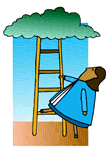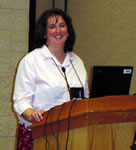The teacher librarian must be an active professional.
 Being
part of a profession is more than just having a job, diploma, and certification.
Professionals are active and involved. They are advocates, mentors,
authors, and peers.
Being
part of a profession is more than just having a job, diploma, and certification.
Professionals are active and involved. They are advocates, mentors,
authors, and peers.
Do I have to wait until I graduate to become part of the profession?
Don't I have to be important to attend a conference?
No one would want me as a mentor!
There's not a formal ceremony that will turn you into a library media professional. Once the library bug bites, you're already becoming part of the profession. Whether you have two months or twenty years on the job, you have something to share with others.
![]() Read
the following chapter and skim through two appendices by Morris in Administering
the School Library Media Center:
Read
the following chapter and skim through two appendices by Morris in Administering
the School Library Media Center:
Chapter 13 - Outside the Walls of the Library Media Center
Appendix I - Choosing and Beginning the Job
Appendix II - Sample Application
Why get involved with the profession?
Explore the following ten reasons you should get involved:
- learn from others
- gather innovative ideas to keep your program fresh and exciting
- get legal, financial, and moral support and advice on issues such as copyright and intellectual freedom
- locate a mentor or become a mentor for others
- stay current on issues and legislation that impacts your job
- build networks with other professionals
- collaborate on projects that wouldn't be possible alone
- share your ideas with others
- make the world smaller through global connections
- meet new friends with similar interests
![]() Read Get
Involved! by C. Harvey II. Teacher Librarian,
April 2005; 32 (4), 32-3. (Access
Requires Login) This article provides information on ways to get
involved in activities of the school library profession.
Read Get
Involved! by C. Harvey II. Teacher Librarian,
April 2005; 32 (4), 32-3. (Access
Requires Login) This article provides information on ways to get
involved in activities of the school library profession.
Go
to the Collaborative
Connections page. Connect to the pdf Presentation
by L. Preddy and C. Harvey. This document is based on a professional
presentation at ICE 2004. It highlights the activities of AIME (Association
of Indiana Media Educators). View the PowerPoint Presentation document.
(It's large, so you may not be able to download it depending on your
service)
Read Your
Ticket to Success by P. Milam.
School Library Journal, Mar 2005; (51)3, 52-4. (Access Requires Login) This
article discusses the steps to qualify as a National Board-certified media specialist.
What professional resources are available?
There are many ways that people get involved with their profession. You may volunteer for a committee in a state organization, attend a national conference, or judge your local media fair.
Start where you feel most comfortable. However don't stick to the local level. There is a tremendous need for leadership at the state and national level. If you don't have the time and money to travel, consider volunteering through the Internet. Contribute to listservs, write journal articles, or share ideas through email groups.
Use the following resources to help you build professional connections:
Professional Organizations. States, national, and international organizations provide a wonderful way to networking within the profession. These groups play a critical role in legislation, advocacy, and professional development.
![]() Explore our page listing Professional Organizations for more information. Join your state and national organizations of choice.
Explore our page listing Professional Organizations for more information. Join your state and national organizations of choice.
Professional E-Communication. Electronic communication has become an essential tool for the library media professional. Without leaving your library, you can share ideas with other practitioners around the world. In addition to maintaining an email list of colleagues, you'll also want to join listservs of interest. If you prefer the web-based threaded format, consider periodically reviewing the professional forums.
![]() Explore our page listing Professional E-Communication for more information. Join one of the listservs or forum and spend some time learning about how they function. Which do you prefer as a tool for professional communication: email, listservs, or forums? What are the advantages and disadvantages or each?
Explore our page listing Professional E-Communication for more information. Join one of the listservs or forum and spend some time learning about how they function. Which do you prefer as a tool for professional communication: email, listservs, or forums? What are the advantages and disadvantages or each?
Professional Journals and Books. Journals can be found for all aspects of the library media profession. Some are more scholarly, while others are more practical. As you explore the options, be sure to consider the perspectives provided. Some are sponsored by organizations, while others are subscription based. While many incorporate advertising, others prefer to use subscription fees for revenue.
Many journals and books are now available in both web-based and paper versions. If you are relying on a particular format, check with the publisher to determine whether the web and print materials are the same or different. Sometimes additional articles are available on the Internet. In other cases, the paper version is complete and only the abstract is available online.
![]() Explore our page listing Professional Journals and Professional Books or more information. Create a personal professional pathfinder listing key professional resources.
Explore our page listing Professional Journals and Professional Books or more information. Create a personal professional pathfinder listing key professional resources.
Professional Websites. Many websites provide valuable information for the library media professional. Some are maintained by schools, public libraries, and agencies, while others are developed by individuals. You can often get ideas for your own website, by exploring the work of others. Why reinvent the wheel? Consider linking to those websites you find most valuable. However, be sure to get permission before reposting original content.
![]() Explore our page listing Professional Websites for more information. Add your favorites to your personal, professional pathfinder.
Explore our page listing Professional Websites for more information. Add your favorites to your personal, professional pathfinder.
Notable Professionals. There are many individuals who stand out in the library media profession. These people have a wide range of experiences and skills. While some focus on research and theory, others have made significant contributes to practice. You need to know the key people in the field. Many of these people maintain personal, professional websites where you can learn more about their work and contributions.
![]() Explore our page listing Notable Library Media Professionals for more information. Add your favorites to your personal, professional pathfinder.
Explore our page listing Notable Library Media Professionals for more information. Add your favorites to your personal, professional pathfinder.
Government Resources. Many government agencies maintain quality resources useful to school library media specialists. These resources can be found at the local, state/province, national, and international levels.
![]() Explore our page listing Government Resources for more information. Add your favorites to your personal, professional pathfinder.
Explore our page listing Government Resources for more information. Add your favorites to your personal, professional pathfinder.
Collection Development Resources. Whether selecting books to purchase or evaluating electronic databases, the library media specialist uses a wide variety of tools in collection selection, acquisition, and use.
![]() Explore our page listing Collection Development Resources for more information. Add your favorites to your personal, professional pathfinder.
Explore our page listing Collection Development Resources for more information. Add your favorites to your personal, professional pathfinder.
Words of Wisdom
Becoming an active member of state and national professional organizations is critical to personal, professional development.
 Read the perspective of one library media specialist:
Read the perspective of one library media specialist:
I think one of the critical things is networking with colleagues and being involved in the professional organizations. AIME, AASL, etc. I can't tell you how invaluable it has been to me to be involved in AIME and AASL. I enjoy the friends I've made, the chance to share and learn from others, and the connections it has provided for future projects and ideas has been unbelievable.
Carl A. Harvey II
Library Media Specialist, North Elementary School
& President, Association for Indiana Media Educators carl_harvey@mail.nobl.k12.in.us
North Library Media Center Webpage
http://www.nobl.k12.in.us/media/NorthMedia/index.htm
Check Your Understanding
![]() Information Power: Program Administration - Principle 8. Ongoing staff development - both to maintain professional knowledge and skills and to provide instruction in information literacy for teachers, administrators, and other members of the learning community - is an essential component of the library media program. (p. 100, 110)
Information Power: Program Administration - Principle 8. Ongoing staff development - both to maintain professional knowledge and skills and to provide instruction in information literacy for teachers, administrators, and other members of the learning community - is an essential component of the library media program. (p. 100, 110)
You MUST know the key professional resources. Review the lists of professional resources. Create a personal, professional pathfinder that includes the following elements:
- a link to this page - http://eduscapes.com/sms/overview/professional.html
- links to 3 national organizations
- links to 2 state organizations
- links to 2 listservs or discussion groups
- links to 5 professional journals
- links to 5 professional websites
- links to 3 quality school library media center websites that you can use as a model for you own
- links to 5 notable people
- links to key selection tools
- links to essential position statements that guide your program (i.e., ALA Right to Read)
- links to sample policy documents that reflect your mission (i.e., sample collection development, selection criteria, reconsideration policy)
- links to key online vendors you would use for purchasing materials, furnishings, equipment, and library & promotion supplies
- Include at least five resources not found within the course materials (Be sure to identify, point-out these select items)
Join a listserv or participate in a professional forum. Describe your experience. Describe why you feel these are or are not a good use of your personal and professional time.
Make It Real
 The photo on the left shows an active Indiana professional. Leslie Preddy is a middle school media specialist and past president of AIME. She recently spoke at the ALA conference in Orlando.
The photo on the left shows an active Indiana professional. Leslie Preddy is a middle school media specialist and past president of AIME. She recently spoke at the ALA conference in Orlando.
You may start out attending state conferences, but eventually volunteer to coordinate one. At first you'll attend conference sessions, but someday you'll be presenting to others. In class you're reading journal articles, but someday you'll write them.
Develop a plan for your own professional development. Where do you see yourself in 1, 2, 5, and 10 years? How do you envision your role in the profession evolving?
What organizations will you join now and in the future? What conferences will you attend?
What will you do this year? Ideas: student festival judge, conference volunteer
Read More About It
Colvin, J. IU-Indianapolis: Library Student Organization.
http://fs6.depauw.edu:50080/~jcolvin/L571/lso_index.htm
Organization exists to promote participation in professional organizations
and provide social and professional development opportunities for SLIS
students.
Harvey II, C. The Rookie. School Library Journal, Sept. 2004; 50(9),
50-53.
http://search.epnet.com.proxy.ulib.iupui.edu/login.aspx?direct=true&db=afh&an=14407888
This article has several strategies to help school library media specialists
survive in their first year of work.
Become familar with the following professional resources (Described Above):
- Organizations
- E-Communication
- Journals
- Books
- Websites
- Notable Library Media Professionals
- Government Resources
- Collection Development Resources